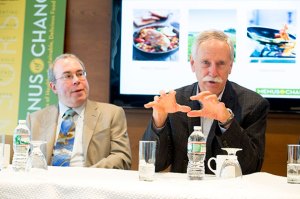Tag: Walter Willett
-
Health
The best thing about the Mediterranean diet? It doesn’t taste like a diet.
Olive oil – maybe not your mom’s – is a good place to start, says Chan School’s Walter Willett. But don’t be afraid to experiment.

-
Campus & Community
Healthier options for people, planet
The Harvard Food Systems Initiative connects Harvard research on food production and consumption with on-campus experiences and meals.

-
Health
Milk used to be simple
Pea, potato, and pistachio milk? Supermarkets now sell multiple kinds of plant-based milks made from nuts, beans, grains, vegetables, or fruit. So how healthy are they?

-
Nation & World
A diet that’s healthy for people, and the planet
At a virtual event, global experts examined obesity and malnutrition in the context of global warming, zoonotic disease, and other agriculture-related threats.

-
Health
A diet that’s healthy for people and the environment
Walter Willett, professor of epidemiology and nutrition at the T.H. Chan School of Public Health, takes a closer look at a diet that is as healthy for you as it is the planet,

-
Nation & World
Hunger on the rise amid pandemic
Experts on food insecurity and diet gathered at an online forum on Tuesday to discuss COVID-19’s impact on hunger in America, and ways to make the post-pandemic food landscape better than that before COVID struck.

-
Science & Tech
Food that’s better for all of us and the planet
According to a summit on food production, diet, and sustainability, humanity needs to refocus on a diet that encompasses sustainability and social justice.

-
Health
Put down those cold cuts
Longitudinal study associates increasing consumption of red meat, especially processed meat, over eight years with a higher risk of death in the subsequent eight years.

-
Health
How to feed 10 billion by midcentury
A panel of experts at the Harvard T.H. Chan School of Public Health discussed how the globe might feed an estimated human population of 10 billion by midcentury and suggested a diet high in plant foods, low in red meat, as well as a host of reforms to how food is produced and distributed today.

-
Health
Sickly sweet
A long-term study, led by the Harvard T.H. Chan School of Public Health, found that the more sugar-sweetened beverages people consumed, the greater their risk of premature death — particularly death from cardiovascular disease, and to a lesser extent from cancer.

-
Health
Eating our way to a sustainable future
Author Paul Greenberg said eating more and different seafood, emphasizing species that are less energy-intensive to harvest and high in omega-3 fats, can help answer the world’s food challenges in the coming decades.

-
Health
Zeroing in on long-term weight loss
The types of calories consumed may influence how likely you are to keep that weight off for the long term, according to a Harvard study.

-
Health
Good fat vs. bad fat vs. high carb vs. low carb
Nutrition researchers with widely varying views on dietary guidelines for fats and carbohydrates offered a model for transcending the diet wars, with both sides agreeing on overall diet quality.

-
Health
Five healthy habits to live by
A new Harvard study has found that by following five healthy lifestyle habits during adulthood, your life expectancy may increase by a decade or more.

-
Health
‘Best diet in America,’ but who knew?
The Harvard Chan School welcomed Lawrence Appel of Johns Hopkins to discuss his work testing the DASH diet.

-
Health
To age better, eat better
Much of life is beyond our control, but dining smartly can help us live healthier, longer

-
Health
Patterns of obesity prove resilient
The Harvard Chan School’s Walter Willett discusses recent findings on obesity, blood pressure, and smoking.

-
Health
The entire egg
Harvard Professor Walter Willett underlined the distinction between dietary and blood cholesterol, and stressed whole foods rather than any single nutrient as key to a healthy diet.

-
Health
Using weights to target belly fat
A Harvard study found that men who did 20 minutes of daily weight training had less increase in age-related abdominal fat than men who spent the same amount of time doing aerobic activities.

-
Health
Calculator adds up cardio risks
The new Healthy Heart Score developed by researchers at the Harvard T.H. Chan School of Public Health gives individuals an easy way to estimate their 20-year risk of developing cardiovascular disease. The free Web-based survey can be found at www.healthyheartscore.com.

-
Health
U.S. diet shows modest improvement
Dietary quality in the United States has improved steadily in recent years, but overall dietary quality remains poor and disparities continue to widen among socioeconomic and racial/ethnic groups, according to a new study from the Harvard School of Public Health.

-
Campus & Community
‘I spend a fair amount of time thinking about what might go wrong’
Interview with Professor Walter Willett as part of the Experience series.

-
Health
The whys of rising obesity
A panel discussion held by the Forum at Harvard School of Public Health probed the reasons for the modern epidemic of overeating and its particularly harmful effects on children, who are especially susceptible to food marketing.

-
Health
Skip the juice, go for whole fruit
Harvard researchers have found that people who ate at least two servings each week of certain whole fruits — particularly blueberries, grapes, and apples — reduced their risk for type 2 diabetes by as much as 23 percent in comparison to those who ate less than one serving per month.

-
Health
Kids are what they eat
Sugary cereals, oversized soft drinks, and quarter-pound cheeseburgers are among the unhealthy food choices kids face daily. Junk food, most of it highly processed, and sugar-sweetened beverages are major contributors to the childhood obesity epidemic.

-
Health
Red meat raises red flags
A new study by Harvard School of Public Health researchers has found that red meat consumption is associated with an increased risk of total, cardiovascular, and cancer mortality.







